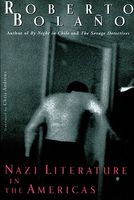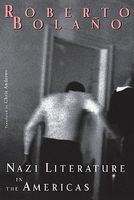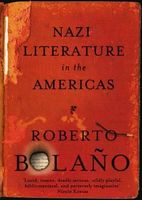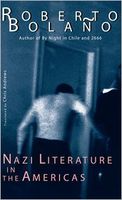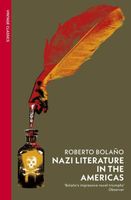- Welcome to FictionDB, Guest
- | My Account
- | Help

Nazi Literature in the Americas — Roberto Bolano
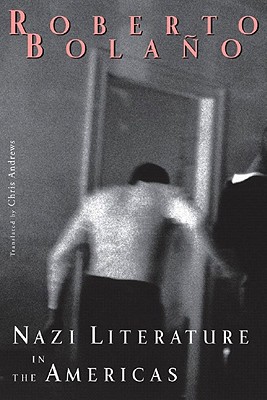
A "biographical dictionary" gathering 30 brief accounts of poets, novelists and editors (all fictional) who espouse fascist or extremely right-wing political views.
Nazi Literature in the Americas was the first of Roberto Bolaño's books to reach a wide public. When it was published by Seix Barral in 1996, critics in Spain were quick to recognize the arrival of an important new talent. The book presents itself as a biographical dictionary of American writers who flirted with or espoused extreme right-wing ideologies in the twentieth and twenty-first centuries. It is a tour de force of black humor and imaginary erudition.
Nazi Literature in the Americas is composed of short biographies, including descriptions of the writers' works, plus an epilogue ("for Monsters"), which includes even briefer biographies of persons mentioned in passing. All of the writers are imaginary, although they are all carefully and credibly situated in real literary worlds. Ernesto Pérez Masón, for example, in the sample included here, is an imaginary member of the real Orígenes group in Cuba, and his farcical clashes with José Lezama Lima recall stories about the spats between Lezama Lima and Virgilio Piñera, as recounted in Guillermo Cabrera Infante's Mea Cuba. The origins of the imaginary writers are diverse. Authors from twelve different countries are included. The countries with the most representatives are Argentina (8) and the USA (7).
Nazi Literature in the Americas was the first of Roberto Bolaño's books to reach a wide public. When it was published by Seix Barral in 1996, critics in Spain were quick to recognize the arrival of an important new talent. The book presents itself as a biographical dictionary of American writers who flirted with or espoused extreme right-wing ideologies in the twentieth and twenty-first centuries. It is a tour de force of black humor and imaginary erudition.
Nazi Literature in the Americas is composed of short biographies, including descriptions of the writers' works, plus an epilogue ("for Monsters"), which includes even briefer biographies of persons mentioned in passing. All of the writers are imaginary, although they are all carefully and credibly situated in real literary worlds. Ernesto Pérez Masón, for example, in the sample included here, is an imaginary member of the real Orígenes group in Cuba, and his farcical clashes with José Lezama Lima recall stories about the spats between Lezama Lima and Virgilio Piñera, as recounted in Guillermo Cabrera Infante's Mea Cuba. The origins of the imaginary writers are diverse. Authors from twelve different countries are included. The countries with the most representatives are Argentina (8) and the USA (7).
Genres
Sub-Genres
Click on any of the links above to see more books like this one.

